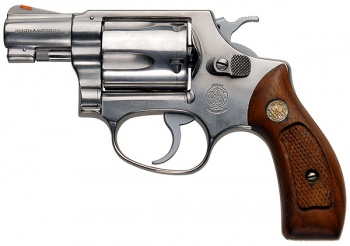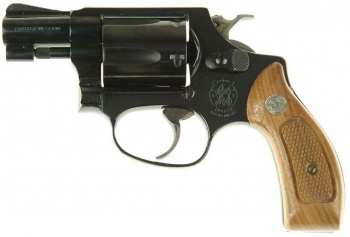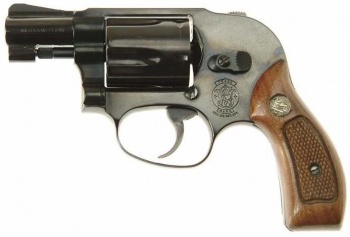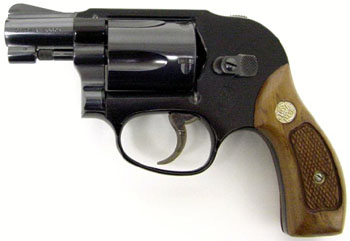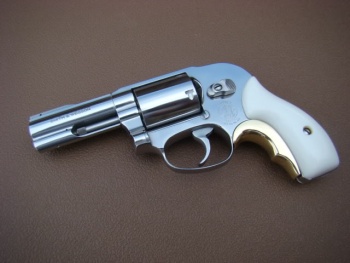| If you have been locked out of your account you can request a password reset here. |
Difference between revisions of "Smith & Wesson Model 36 / 38"
(→Film) |
StanTheMan (talk | contribs) m |
||
| Line 1: | Line 1: | ||
'''The Smith & Wesson Model 36/38/49 is used in the following:''' | '''The Smith & Wesson Model 36/38/49 is used in the following:''' | ||
| + | __TOC__<br clear=all> | ||
== Smith & Wesson Model 36 "Chiefs Special" == | == Smith & Wesson Model 36 "Chiefs Special" == | ||
| Line 5: | Line 6: | ||
[[Image:StainlessS&WModel36.jpg|thumb|right|350px|Smith & Wesson Model 60, stainless variant of the model 36 - .38 Special.]] | [[Image:StainlessS&WModel36.jpg|thumb|right|350px|Smith & Wesson Model 60, stainless variant of the model 36 - .38 Special.]] | ||
[[Image:M36.jpg|thumb|right|350px|Smith & Wesson Model 36 - .38 Special]] | [[Image:M36.jpg|thumb|right|350px|Smith & Wesson Model 36 - .38 Special]] | ||
| − | |||
The Smith and Wesson Model 36 (often called simply ".38 snubnose") was introduced in 1950 as the "Chief's Special" (sometimes called the "Police Chiefs Special"). When Smith & Wesson adopted a model number only system seven years later, the revolvers' name was changed to Model 36. It is famous as being the first J-frame revolver in the S&W series (the earlier models were called "I-frames"). It is commonly used as a "belly gun", being stuffed in the pants waist, or as an officer's "Spare Rod", strapped to the ankle in a holster. It holds five rounds of .38 special. | The Smith and Wesson Model 36 (often called simply ".38 snubnose") was introduced in 1950 as the "Chief's Special" (sometimes called the "Police Chiefs Special"). When Smith & Wesson adopted a model number only system seven years later, the revolvers' name was changed to Model 36. It is famous as being the first J-frame revolver in the S&W series (the earlier models were called "I-frames"). It is commonly used as a "belly gun", being stuffed in the pants waist, or as an officer's "Spare Rod", strapped to the ankle in a holster. It holds five rounds of .38 special. | ||
Revision as of 04:24, 13 October 2010
The Smith & Wesson Model 36/38/49 is used in the following:
Smith & Wesson Model 36 "Chiefs Special"
The Smith and Wesson Model 36 (often called simply ".38 snubnose") was introduced in 1950 as the "Chief's Special" (sometimes called the "Police Chiefs Special"). When Smith & Wesson adopted a model number only system seven years later, the revolvers' name was changed to Model 36. It is famous as being the first J-frame revolver in the S&W series (the earlier models were called "I-frames"). It is commonly used as a "belly gun", being stuffed in the pants waist, or as an officer's "Spare Rod", strapped to the ankle in a holster. It holds five rounds of .38 special.
Film
- George Kennedy as Capt. Ed Hocken in The Naked Gun 2 1/2: The Smell of Fear (1991)
- George Kennedy as Capt. Ed Hocken in Naked Gun 33 1/3:The Final Insult (1994)
- N.Y.P.D. officers in The Hot Rock (1972)
- Richard Roundtree as Shaft in Shaft's Big Score! (1972)
- William Devane as Janeway in Marathon Man (1976)
- Mel Brooks in High Anxiety (1977)
- Graham Beckel as Det. John Taylor in Jennifer Eight (1993)
- Tom Selleck as Chief Jesse Stone in Jesse Stone: Thin Ice
- James Caan as Sonny Corleone in The Godfather
- Robert De Niro as Travis Bickle in Taxi Driver
- Nat Grant as Store Robber in Taxi Driver
- Shawn Doyle as Jack Shepard in Frequency
- Art LaFleur as Captain Sears and Andrew Robinson as Detective Monte in Cobra
- Bruce Willis as Lieutenant John McClane in Die Hard with a Vengeance
- Sylvester Stallone as Det. Ray Tango in Tango & Cash
- An unruly bus passenger in Speed
- Yakuza gangsters in The Yakuza
- Lee Van Cleef as warden Bob Hauk in Escape from New York
- Tupac Shakur as Bishop in Juice
- Laurence Fishburne as Lt. Charlie Stobbs in Red Heat
- Joseph Siravo as Vincent Taglialucci in Carlito's Way
- Donald Li as Eddie in Big Trouble in Little China
- Sheri Moon Zombie as Deborah Myers in Halloween (2007)
- Peter McRobbie as Agent John Hanlon in In the Line of Duty: The FBI Murders
- Lawrence Montaigne as Ubermann in Escape to Witch Mountain
- Ed Lauter as Shriker in Death Wish 3
Television
- Jack Lord as Steve McGarret and other charcters in Hawaii Five-O (1968)
- Edward Furlong as Shane Casey and Jason Earl Carter as the 'peep show guy' in CSI: NY (episode: "Raising Shane")
- Chris Noth as Detective Mike Logan in Law & Order
- Jerry Orbach as Detective Lenny Briscoe on Law & Order
- Skip Sudduth as Officer John "Sully" Sullivan in Third Watch (1999 - 2005)
- Eric Wareheim as himself in "Tim and Eric Awesome Show, Great Job!"
- Ingrid Chauvin as Marie Kermeur in "Dolmen"
- Bailey Chase as Jason Clark Battle in Criminal Minds
Anime
- In Mirai Keisatsu Urashiman, the character Ryu found a broken one in an antique store, and used it as the base for the laser gun he built for himself, which he dubbed a "Smith and Wesson-style Magna Blaster".
- Seen breifly in the opening of Gunsmith Cats
- Used by Elroy, a hitman hired by Hotel Moscow in Black Lagoon
- Used by Takashi Komuro in High School of the Dead
- A nickel-plated model appears on several occasions in Eden of the East and Eden of the East the Movie I: King of Eden
Smith & Wesson Model 38/49
The Smith & Wesson Model 38/49 "Bodyguard" is a Model 36 that has a "Camel Hump" hammer shroud used to prevent clothing snag, as the hammer is concealed in the shroud. The Smith & Wesson Bodyguard was unusual in that the alloy framed "Airweight" version was released first, as the Smith & Wesson Airweight Bodyguard, in 1955. In 1957 Smith & Wesson introduced a new model numbering system, with the Airweight Bodyguard becoming the Model 38. The steel-framed Bodyguard, the Model 49, was not introduced until 1959, unusual in that most Ariweights were preceded by their steel counterparts.
Film
- Tom Selleck as Jimmie Rainwood in An Innocent Man (1989)
- Vanessa Williams in Eraser (fitted with Harret grips)
- Don Cheadle as Cash in The Family Man (nickel with mother of pearl grips)
- Edward Norton as Will Graham in Red Dragon
- Unknown man and woman in Moonraker
- Charles Bronson as Jeff Heston in The Family (Città violenta) (1970)

